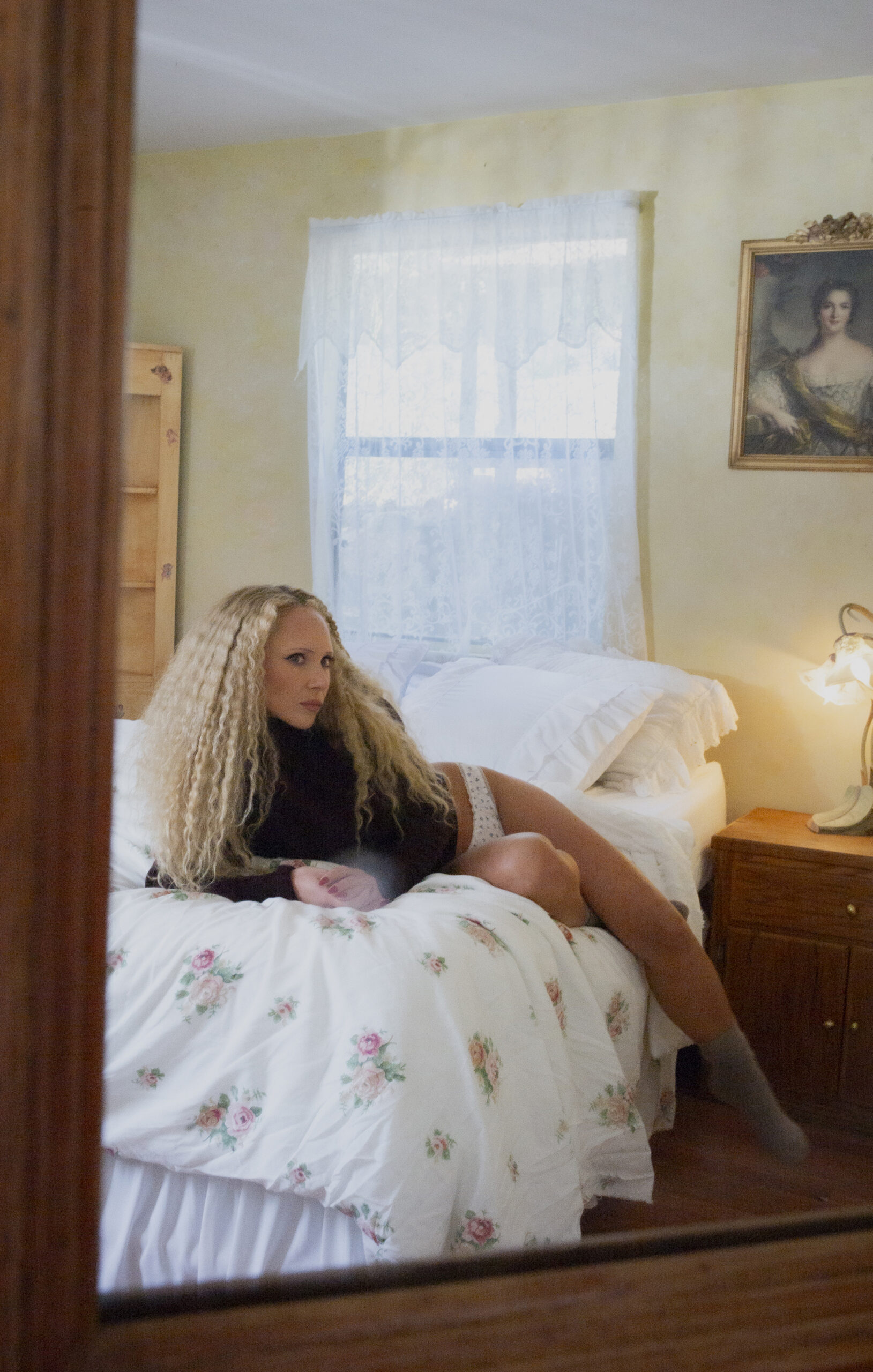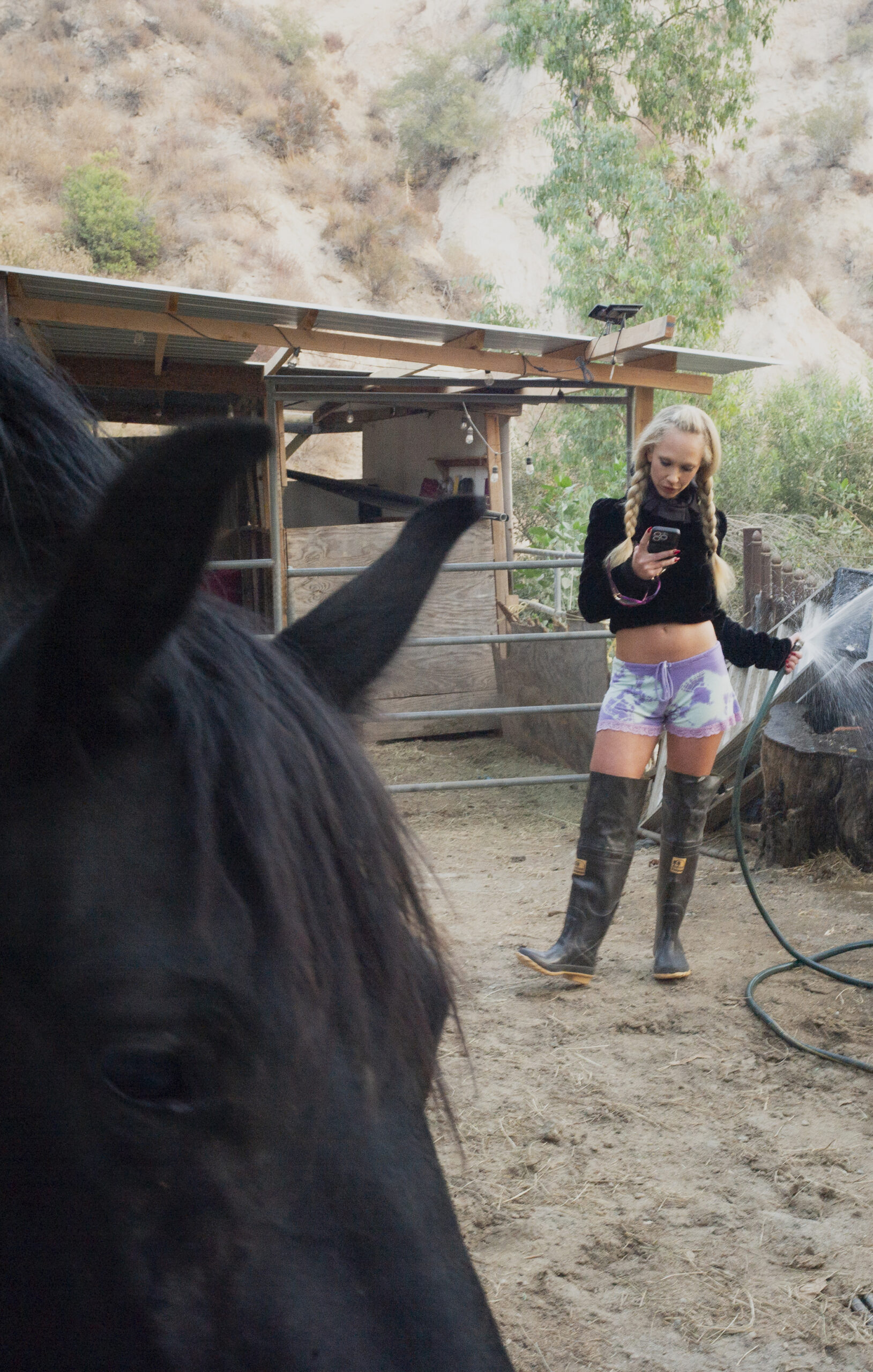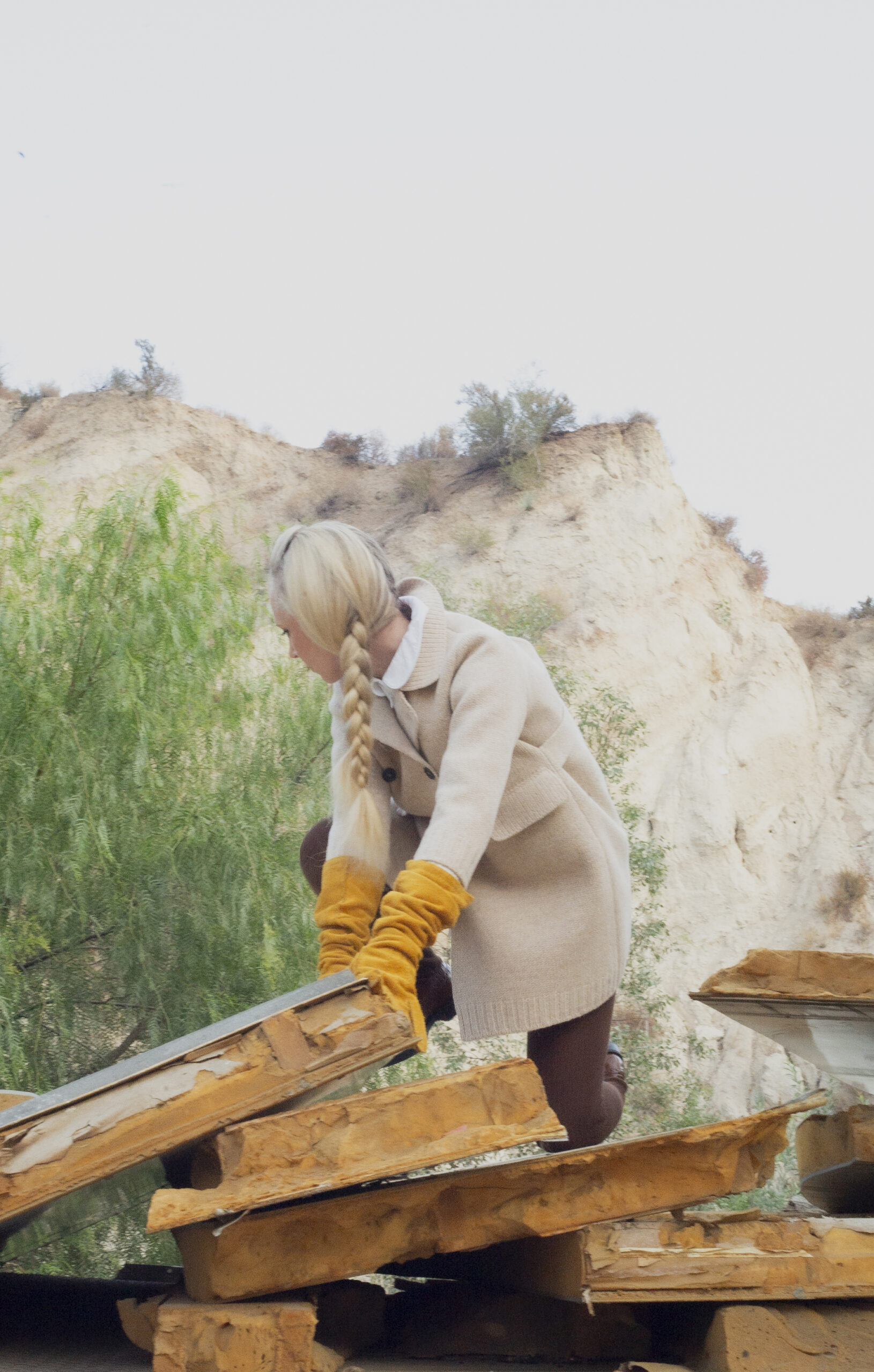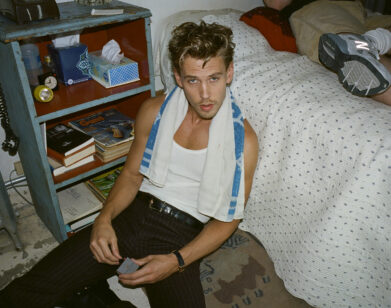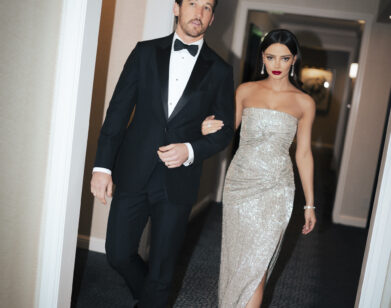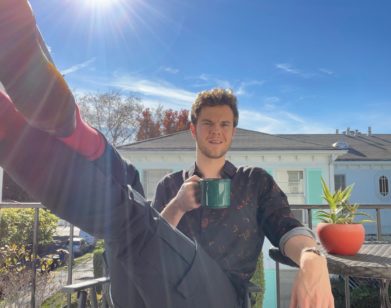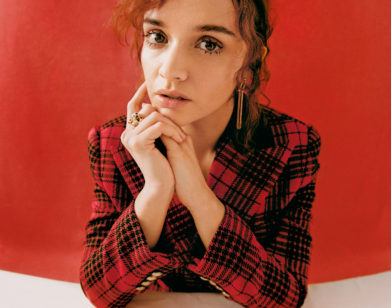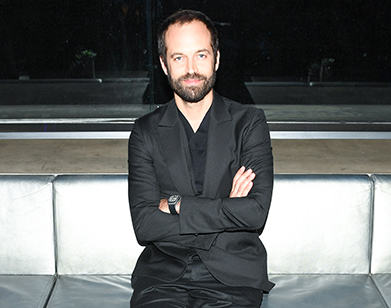MOVIE STAR
“Film Is Forever, Baby”: Juno Temple, in Conversation With Miles Teller
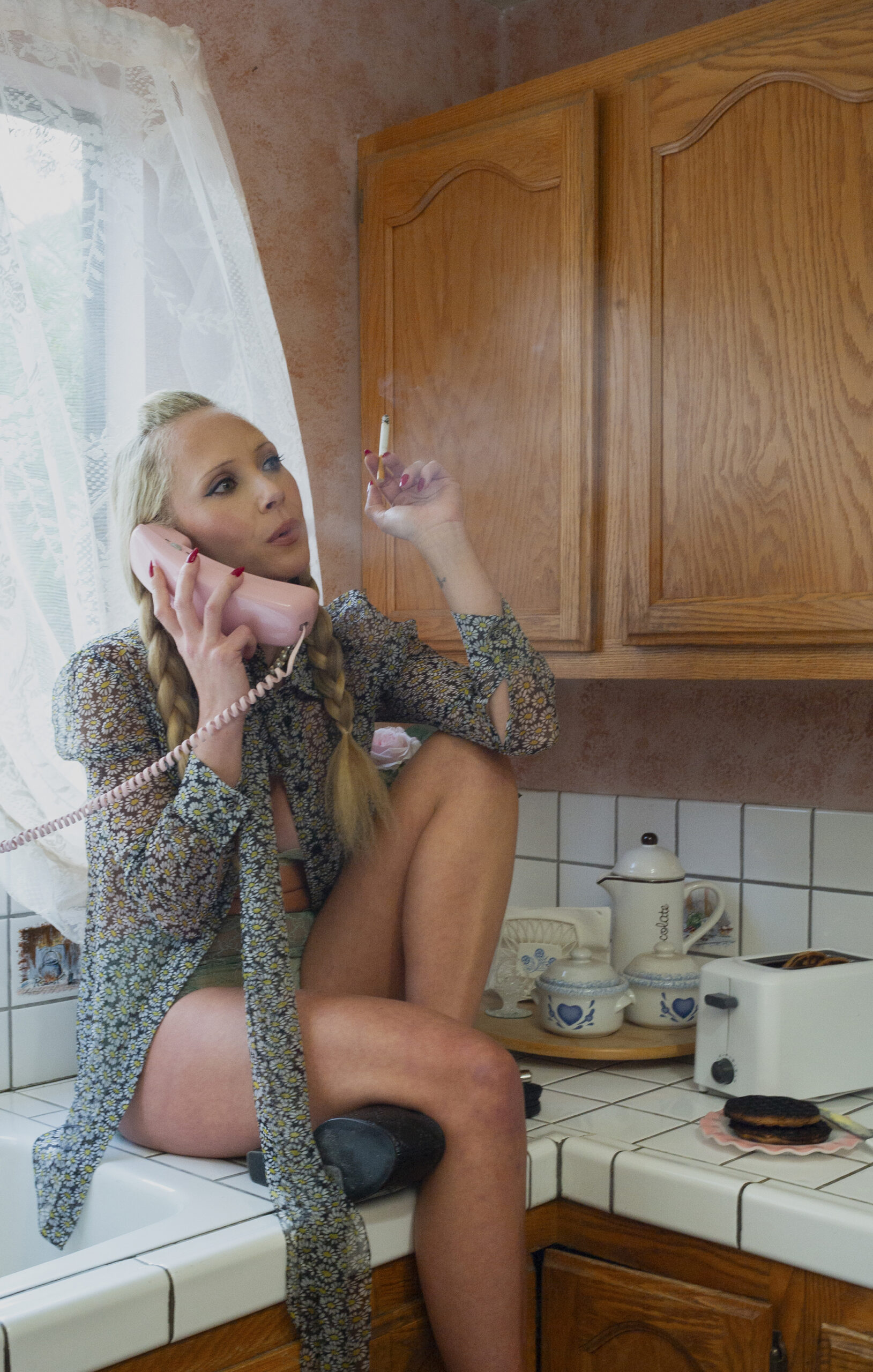
Juno Temple wears Top, Bra, Underwear, Necklace, and Shoes Gucci.
Juno Temple doesn’t like watching herself on television, although that’s exactly what the actor was doing when her friend Miles Teller called. “Shut up, I’m making myself cry,” she joked. On screen, the 35-year-old has been known to shed a few tears, too. As Keeley Jones, the well-intentioned WAG of Ted Lasso, Temple emerged as the emotional heartbeat of the beloved Apple TV series, blending empathy and resolve in a way that’s become typical of her characters. “That’s what I loved, even before I had worked with you,” Teller gushed. “You have so much energy.” Nowadays, Temple is directing that dynamism towards her new film, the third installment of the Venom trilogy, in which she plays a symbiote-obsessed researcher alongside Tom Hardy. Before her first proper press junket, Temple phoned up the Top Gun hunk for some veteran advice.—EMMA STOUT
———
MILES TELLER: I love your hair right now.
JUNO TEMPLE: It’s so big. It’s like, double my face. Look how chic your office looks.
TELLER: Oh, I know. It’s a bit of a work in progress, but yeah, it’s coming.
TEMPLE: Stunning.
TELLER: I know. My wife’s taken every room in the house. That’s just how it goes for us guys, I guess.
TEMPLE: Yeah, chaos. But good chaos. The coffee table’s covered in my jewelry-making kit, you know how it goes. I wish I knew where things were supposed to live in my house, but I don’t instinctively, so everything ends up being on display. Then any cupboard I have ends up being empty. It’s ridiculous. The desperation of needing an organizer is next level.
TELLER: You can have an organizer and this and that, but that’s your space, Juno. What you just showed, that’s how you operate. I think you do very well inside the controlled chaos.
TEMPLE: But if somebody organizes for me, I can maintain it. It’s just the actual part of my brain that is lacking the skill of how to organize things in the first place. But at the same time, when it comes to a script, it will all be color-coded in an emotional kind of sticky tab rainbow and the notes will all make sense. If you ask me for somebody’s telephone number, I couldn’t repeat it to you. I can’t even remember what airline I just flew. But somehow, my brain turns on in a way that makes me want to remember lines. And so, I can.
TELLER: Your brain definitely gets very excited. That’s what I loved, even before I had worked with you. You have so much energy and I think it’s wonderful for audiences. We’re able to see you put all that energy into the characters.
TEMPLE: And I don’t know how to do it any other way. That’s the joy of what we do—wanting to dive into the headspace of the person that you are going to be existing with for however many weeks, months, or days. The process is, for me, about really understanding from your own perspective if that character is right for you to get to know and also being excited to learn the world through their eyes. That genuinely is endless, isn’t it? The possibilities. That’s why I love what we do so much because it’s this constant state of learning. It doesn’t mean you always get it right, but you’re always exploring. But it can be really frightening, I guess. Being able to enjoy what you do, even on the really hard days, is something that shows on a screen at the end of the job. It’s something you can’t lie about.
TELLER: Film is forever, baby.
TEMPLE: I know. When I was younger, I felt like I was more attracted to stories that felt more emotionally extreme or had some kind of shock value. Well, when you are younger, you feel all these different things that you don’t quite understand and you sometimes don’t know how to talk about it, so you will go to the extreme of being shocking to make people listen to you. And then signing onto something like Ted Lasso was terrifying because it was a proper comedy show with proper brilliant comedians.There were the same amount of sticky tabs throughout those scripts as there were on all the dramas, too. Now, in my thirties, I think the roles have become so interesting. I’ve played a couple of mothers and I think that’s been an extraordinary journey. Then in Venom, I got to work with aliens. It’s almost like you live your life, you put it on film, and you can kind of see your growing up journey a little bit.
TELLER: Well, if you want to have a long career, it’s inevitable that your audience is going to have to grow with you. That’s the beautiful thing– you can never take your audience for granted. Like, you saw me when I was 20. You really grow up together.
TEMPLE: Totally. I think it’s going to be an amazing thing to keep doing this as I get older because there are definitely things that I find difficult about getting older. But on camera, you can forget about all of it. Any kind of weird obsession you have about wrinkly knees or something– they say action, and you forget it happens.
TELLER: Do you have wrinkly knees? I don’t think… That’s the first time I’ve even… Honestly, I feel like my knees are the one spot I don’t have wrinkles. That is so specific.
TEMPLE: It was specific.
TELLER: But it is tough. How do you feel about watching yourself?
TEMPLE: I’m literally watching something right now with myself. Shut up, I’m making myself cry. This is a great scene. Oh my god, it’s one of my best. But do I like watching myself? I think it depends on how I felt making it. Like, how I felt I was doing at my job. I’m still kind of getting used to watching myself, I guess, in a weird way. It’s not something I love and I’m super excited to do, but it can be really interesting from a learning standpoint. I’ve never watched something that I’ve been in twice, that I would say. Except once, when we were in the first round of COVID and I went to New Zealand to shoot something. I had to quarantine for two weeks in a hotel, and there were only two channels that played movies. A film that I was in played every other day, three times throughout the day. That was a nightmare. It was like a version of torture.
TELLER: You got to do more press tours in New Zealand. Your movies are playing for fun. I tell my team all the time, “I’m huge in Korea. We need to cycle this press tour through Korea.”
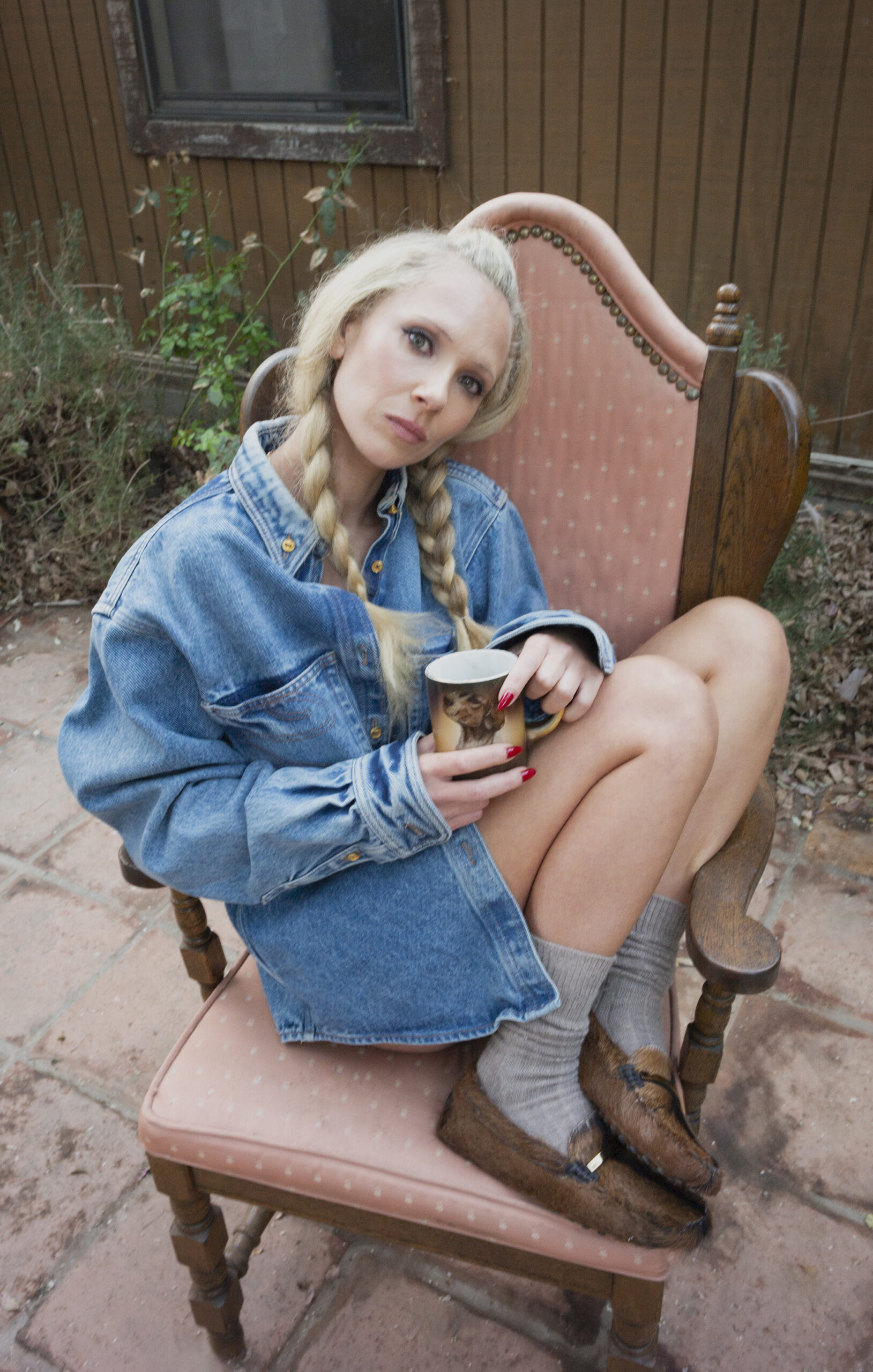
Shirt Schiparelli. Socks Banana Republic. Shoes by Tod’s.
TEMPLE: But you are somebody. You’ve done these big press tours before. I‘m about to do my first kind of press tour for a movie, and I’m quite intimidated by it. I’ve done press days, but I feel like a press junket is a whole new kind of experience. Do you find that it gets easier?
TELLER: I think when I first started out, I didn’t really care how many people saw the film. I was like, “I made that for me, man. I care about this. If a hundred people see it, a hundred people see it.” But it sucks. You put so much effort into making a film, into 30 seconds on screen sometimes, and you take time away from your friends and your family because you believe in this thing and then it comes out and nobody sees it. And if your movie doesn’t have an audience, it’s kind of like what was the point? Personal growth and this and that. But it’s a global stage now and I think it’s wonderful if you can make something that connects with all different types of cultures. I guess, for me, I hate feeling like I’m selling something.
TEMPLE: Well, I am not the person to do that. Once, I did a show with Julia Garner on Bravo and we were filming the ‘check in and watch this show at this time’ footage. I was so bad at it that they were like, “You know what, Juno? We actually think that we won’t have you do this section.” I’m so interested in personal moments with people. It becomes a different kind of thought process if it’s a space where you feel like you can’t connect with people individually. I always have to approach a story from a human perspective.
TELLER: You’re comfortable with that, and I think that’s a massive thing. As long as I feel comfortable and trust the director, I will do whatever they want.
TEMPLE: Yeah, me too. And it can be crazy. I don’t have driver’s licenses. I can’t for the life of me figure out how to drive, but I do drive in Venom and I did it for real. It was this realization for me—when you say action, I can do things. But the minute you say cut, I can’t.
TELLER: I know you like to take a lot of clothes off set.
TEMPLE: I do.
TELLER: I still like props.
TEMPLE: You do?
TELLER: I’m a props guy, I’m taxing.
TEMPLE: I have a prop that I was gifted from the prop guys on The Offer. It’s in this house, actually, on the table over there. But it’s a cigarette holder that’s an old looking wine bottle. Yeah, it’s fucking great. They gave it to me on the last day. Keeping something from a job is something that is really precious because quietly it’ll catch your eye and you’ll be like, “Wow, that was 10 years ago. That moment was really special.” When we did The Offer it was the costumes– how differently they make you hold yourself. We got to actually walk around in an outfit that was worn by somebody in the 1960s or 1970s.
TELLER: Now, when you take your clothes from a job, do you wear those out in everyday life? Or do you just keep them as kind of this vault of another time?
TEMPLE: Oh no, I have definitely gone out in them. I was part of this show called Vinyl, and a box showed up at my tiny house that I was living in LA at the time after we wrapped. And they had gifted me pretty much my entire wardrobe. It was really brilliant, all these incredible silk Biba jumpsuits from the seventies that I wore out dancing in LA for sure. And a lot of the stuff on Ted Lasso was my own wardrobe that I don’t have the balls to wear as Juno. Even with The Offer, some of the things I brought to the table were personal pieces. I think that’s another reason why I’m obsessed with collecting vintage things—at some point, it’ll be useful for someone. They’ll want to wear it. And then, it has an extra story, something a little extra special.
TELLER: Was acting always the first thing?
TEMPLE: No, I was going to go to fashion college, actually. I wanted to design surrealist-inspired lingerie, and I got a scholarship to London College of Fashion.
TELLER: Audience is still waiting for that.
TEMPLE: Oh, I’ve still got all the designs. I’m waiting for somebody to back me.
TELLER: Keleigh can make a line.
TEMPLE: Yeah, if she’s offering it. But not everybody wants eggs and bacon for their underwear and bra. I did drama at school until I was 18, and I really enjoyed learning about Shakespeare. The rhythm that came through his language was something that I was really fascinated by but felt very different to the experience of watching films. I would put on plays as a little girl, too. Then there was one day where I decided to tell my parents that I really would like to try and be an actress. And both of my parents were like, “Fuck, really?”
TELLER: Was that the response?
TEMPLE: Yeah. They weren’t stoked about it. They know that you get told no a lot and it hurts. I think quite early on in a career, you have to be able to understand why the ‘no’ is happening. Of course, you can’t help but take it personally sometimes. I was 17 when Tim Burton made Alice in Wonderland. I have a first edition copy of Alice in Wonderland that I actually sleep with on my bedside table like it’s the Bible.
TELLER: You have a very cluttered bed.
TEMPLE: A lot of faux fur. But it was a dream role for me. I wanted to play Alice so badly. I remember my agent called, and the first thing he said was, “Are you sitting down? We just wanted to tell you that Tim Burton doesn’t think you are right for Alice, so there’s actually not going to be an audition for it.” I was devastated.
TELLER: That’s a quick trigger.
TEMPLE: No, but wait. I watched the movie. And this was a really important realization for me at 17 years old– I wasn’t right for Alice. I’m the Queen of Hearts. When you see a final product, it always makes sense as to why you were not the fit for that role at that moment in time. I auditioned for a few of those Disney remakes. And it’s like, I’m not Cinderella.
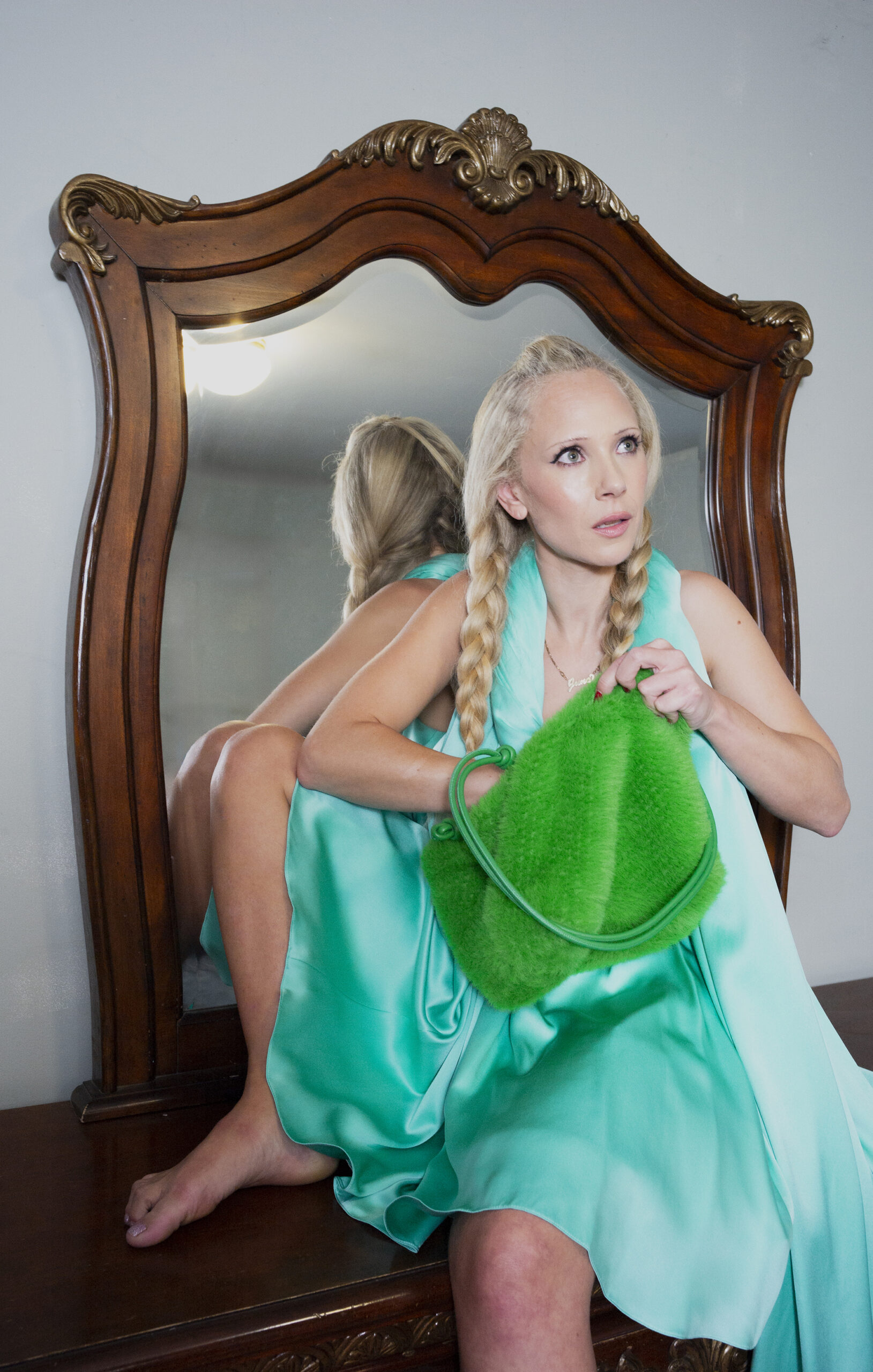
Dress and Bag Loewe.
TELLER: Depends on what kind of Cinderella.
TEMPLE: I could potentially turn around and say, “Fuck you,” to my stepmom. “I’m going to the damn party.” Sometimes when I’ve read something, I think, “Maybe I’m not right for this, but you know who is? I have a really great person that you should meet.” People have always said that being competitive in this industry is important. And to a degree, it is. But I also think it’s really important to be supportive. Actors, we’re a bunch of unusual people and we have unusual things that turn us on and turn us off. And I respect that on a huge level. Because like you said, film is forever. You don’t want to pretend.
TELLER: So Alice was one that crushed you. What are some other ones that you felt like you manifested and didn’t get?
TEMPLE: I think there have been a few jobs that I would’ve just loved to have been in, but do I think I would’ve necessarily been the right choice? I have no idea.
TELLER: Not necessarily that you would’ve been better– it would’ve been a different version.
TEMPLE: I mean, there was a moment with Birdman. Emma Stone had been attached to it, and then there was a conflict with her schedule. And suddenly it was like, “Oh my god, people are going to be able to audition for it.” I remember reading the script and I just thought it was brilliant. I was on my way to the audition, and then my agents called me and were like, “They figured out the schedule.” But what about you? Have you had one that really crushed you?
TELLER: When I was younger, I auditioned for The Descendants, and I remember I got to read with Alexander Payne. That was one. I just really wanted to work with Alexander and thought I was right for it. I don’t know, it can get tough not to take it personally. But I’ve always been a firm believer that everything happens for a reason. And I get a little bit of a chip on my shoulder– that’s something I work well with. Now, was Vinyl the first limited series that you did?
TEMPLE: It was supposed to go on for more seasons, actually. But it was the first time I had ever auditioned for television because I really didn’t grow up watching TV shows. It was a world that I didn’t understand, and I really wasn’t interested in committing to something that could potentially go on for six years of my life. Then Vinyl came around and it was this script about music in the 1970s in New York, and the pilot was directed by Martin Scorsese, and I was like, “Yeah, I’ll give TV a go.” I think I could spend six years doing that.
TELLER: It was kind of before the…
TEMPLE: Explosion of TV.
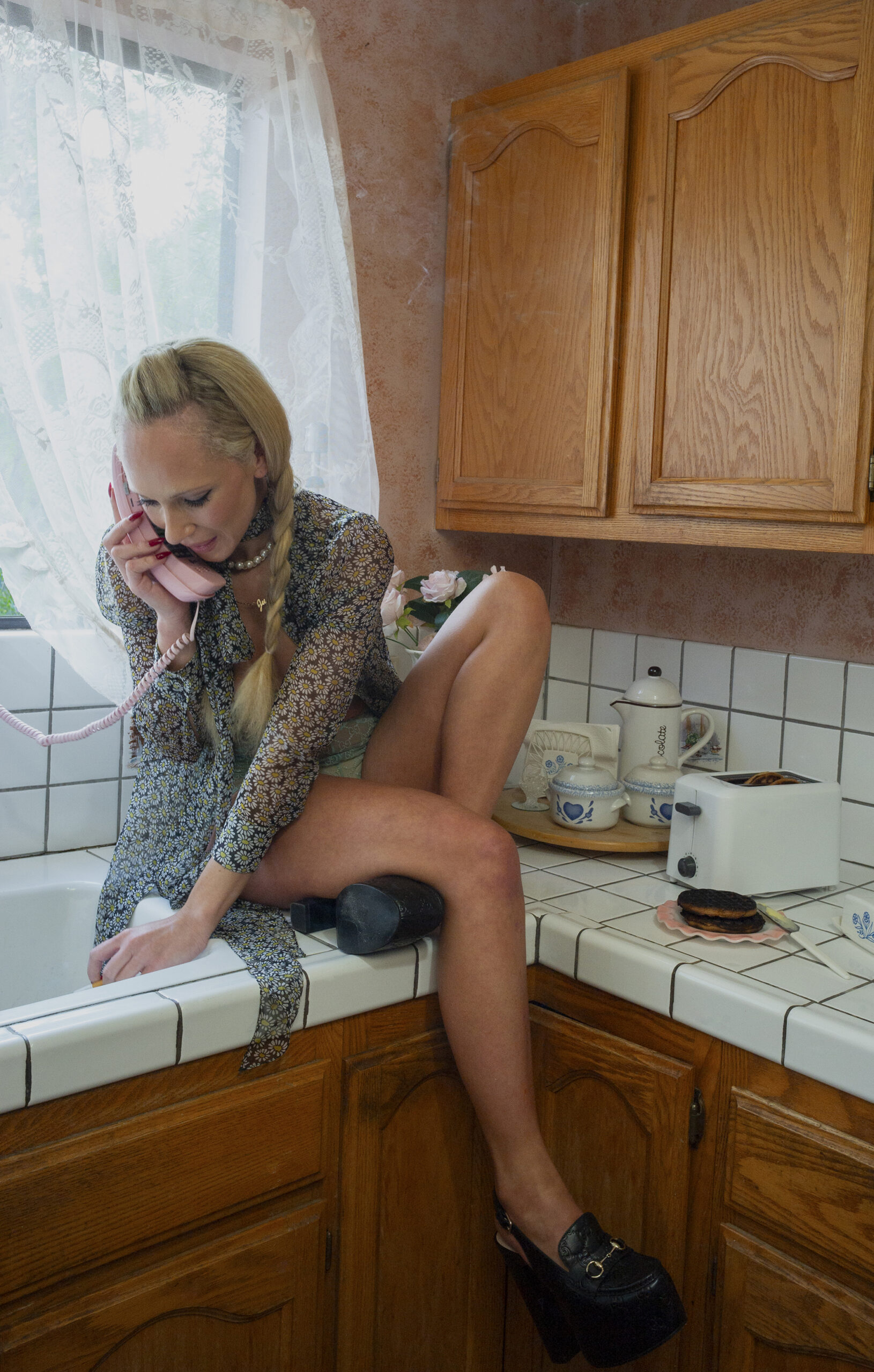
TELLER: Exactly.
TEMPLE: Yeah. I mean, there were shows that people were obsessed with, but it was before any of these streaming services were around. I did one audition in New York for Vinyl, but I didn’t think I got the job when I read for Martin in LA. It was very quick. I was like, “Oh my god, I just blew this audition with Martin Scorsese.”
TELLER: Isn’t that so funny? In his mind, he’s like, “I just found my girl.”
TELLER: I remember when I first moved to LA, I got callback for a show. Next thing you know, you’re signing this contract because you have to sign before you do the final audition.
TEMPLE: And it’s six years normally, right?
TELLER: Yeah, it’s like six years. I feel like, in print, this can come off as arrogant or cocky because you’re just trying to get work. But I wanted to explore different characters.
TEMPLE: I’m going to take you outside for a cigarette quickly.
TELLER: I don’t want to go outside.
TEMPLE: You have no choice.
TELLER: I’m going to get cold.
TEMPLE: Put on a coat. We know that you like it to be chilly.
TELLER: It’s got to be freezing. And I need a fan.
TEMPLE: I also think what’s changed as we’ve gotten older is that TV is really taking these risks that independent film always did. You’ll be attached to these beautiful scripts, and I’ve been really grateful for that. I don’t know why I’m still nervous about it. I think it’s the idea of committing to something for six years consecutively. I need a break from Juno often. And if there was another consistent character that I had to also inhabit… I don’t know.
TELLER: I don’t know if screenwriting is just not as sexy to writers now, but they have absolutely found their medium in limited and ongoing series. Because they create it and a lot of times become the showrunner, so they have more impact on the final product. At the end of the day, obviously you’re chasing great directors. But it all starts with the script– do you want to invest so much time and energy into inhabiting this headspace?
TEMPLE: With any job, I’ve always been interested in the character that I would be playing. It doesn’t matter if I’m going to be on set for a day or a year. I mean, I really love what we do and the exploration of minds and walks of life that we get to experience together. I remember when you and Keleigh were in London for the Top Gun premiere and invited me and my man. When the movie opened and your name was in the credits, I was like, “Oh my God, my friend’s in a really big movie.” It was a thing. It was something that was such a thrill. And I don’t want that shit to ever get old. I want to be excited when my friends are in a fucking cool movie. Because it’s crazy and exciting– those are the things that you pinch yourself about as a little girl who used to go to the movies.
TELLER: Absolutely. And when you make something that really lands with an audience nowadays, it’s wonderful because people have so many options. Movies used to be in theaters for over a year. So it’s tough to be part of the thing that breaks out. When you’re thinking about projects, have you told your agent, “I want to do a movie,” or “I want to work with this director?” Do you kind of steer it before it comes across your desk? Or do you just let it come?
TEMPLE: Well, I think Ted Lasso opened a lot of doors for me in the past couple years. I’ve been acting since I was 16. But being offered parts is still kind of wild, I’m getting used to that. I’m really interested in working with certain artists, and I think I should be so lucky if they would like to work with me back. Sometimes it happens. I got to work with you. I wanted that.
TELLER: I loved working with you.
TEMPLE: So did I. And not to be weird, but I really was a big fan. Getting to work together and create that storyline was so cool. And with Venom coming out, I’m a huge Tom Hardy fan.
TELLER: Who’s not?
TEMPLE: Exactly. To go and be a part of the world that he’s created with this character– that was something that’s just really exciting. I can navigate things to a certain degree, but at the same time, it’s good to be surprised in a scene. I like to be surprised by what people might think that I am capable of. And then I can be surprised by it, too.
TELLER: I agree with you. If I’m really nervous about a project, I think that tends to create really diligent and expansive work. It’s good to be a little scared. Juno, what is next for you, darling?
TEMPLE: Well, I got to go to South Africa and work with another hero of mine, Sam Rockwell, for a new movie. I had such an amazing time. And now, I’m about to do my first junket days for Venom, which is going to be scary but fun.
TELLER: You got outfits picked out?
TEMPLE: Starting to do that process this week, actually. That will be a new experience because I think doing Venom in itself was a whole new experience. Getting to be a part of something on that kind of a scale was kind of mind-blowing, to be honest with you.
TELLER: I just want to end it with one question because I think it’s a cliffhanger for our audience who’s reading this: Juno, what did you wear to that fucking UTA Christmas party?
TEMPLE: You know what? I actually don’t remember. I just remember that I got the part.
———
Hair: Lauren Palmer-Smith using Bumble and Bumble at Forward Artists
Makeup: Eden Lattanzio using Saie at Forward Artists
Nails: Merrick Fisher using Dior at Celestine Agency
Prop Stylist: Kelly Infield at WSM
Photography Assistant: Amalia Irons
Fashion Assistant: Emily Cancelosi
Production Manager: Vince Barrucco

